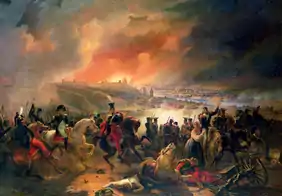Jean-Charles Langlois | |
|---|---|
.jpg.webp) Jean-Charles Langlois, 1911-1915 | |
| Born | 22 July 1789 Beaumont-en-Auge, France |
| Died | 23 March 1870 Paris, France |
| Nationality | French |
| Education | École Polytechnique; Girodet-Trioson |
| Known for | Painter |
| Movement | Orientalist |
Jean-Charles Langlois, known as The Colonel (22 July 1789 – 1870) was a French soldier and painter.
Biography

Langlois was born in Beaumont-en-Auge. He graduated from the École Polytechnique in 1806 and fought, as an infantry officer at the battles of Wagram, Gerona and Waterloo with a bravery that had him seriously injured and appointed colonel at the young age of twenty-six.
After he retired on half-pay, Langlois devoted himself to painting. Studying with Girodet-Trioson, he specialized in landscapes, painting battles only, for he considered these to embody the most intense experiences life could offer. His paintings include the Fire of Moscow, the Battle of Eylau, the Battle of the Nile, the Battle of Montereau, the Battle of Borodino, the Battle of Wagram. He also used photography to document the Crimean War where he traveled with photographer Léon-Eugène Méhédin. He specialized in panoramic painting after having seen the Panorama of Athens by the first French panorama painter Pierre Prévost. Many of his panoramas were destroyed during the Siege of Paris (1870–1871).
In 1873, Langlois' family bequeathed 256 paintings representing battles and military panoramas to the musée des Beaux-Arts de Caen.[1] These paintings were transferred in 1888 to the Pavillon des sociétés savantes, an 18th-century building spruced up at his niece's expense to house the Langlois museum.
Half of the works exhibited there were destroyed in 1944 during the Battle for Caen. François-Émile de Lansac was his pupil.
Publications
- Explication du panorama et relation de la bataille de Solferino, Paris, Dupont, 1866.
- Explication du panorama représentant la bataille et la prise de Sébastopol, Paris, Havard, 1861.
- Explication du panorama, et relation de la Bataille des pyramides: extraite en partie des dictées de l'empereur à Sainte-Hélène, et des pièces officielles, Paris, Didot, 1853.
- Relation du combat et de la bataille d'Eylau, Paris, Panorama des Champs-Élysées, 1844.
- La Photographie, la peinture, la guerre: correspondance inédite de Crimée (1855-1856), Éd. François Robichon, André Rouillé, Nîmes, Chambon, 1992. ISBN 2-87711-067-2
- Panorama de la bataille de la Moskowa, Paris, Ducessois, 1835.
- Voyage pittoresque & militaire en Espagne: dédié à S.E. Mr. le Mal. Gouvion St. Cyr, pair de France, Paris, Engelmann, 1826–1830.
See also
References
- (in French) Jean-Charles Langlois, 1789–1870: le Spectacle de l'histoire, Paris; Caen, Somogy; Musée des beaux-arts de Caen, 2005. ISBN 2-85056-894-5
- (in French) Jean-Charles Langlois, Photographe normand et le panorama de la bataille de Solferino, Hérouville Saint-Clair, ARDI; Caen, Archives départementales du Calvados, 2000. ISBN 978-2-86014-058-4
- (in French) Maxime Du Camp, "À travers l'Orient", Souvenirs littéraires, 1882.
- (in French) Claudette Derozier, La Campagne d'Espagne, lithographies de Bacler d'Albe et Langlois, Paris, les Belles lettres, 1970.
- (in French) François Robichon, Le Colonel Langlois 1789-1870: un peintre de l'épopée napoléonienne: collections du Musée Langlois, Caen, Paris, Bernard Giovanangeli, 2000. ISBN 2-909034-22-4
- John Zarobell, "Jean-Charles Langlois's Panorama of Algiers (1833) and the prospective colonial landscape", Art history, Oxford 26 (5) November 2003, p. 638–68, 785.